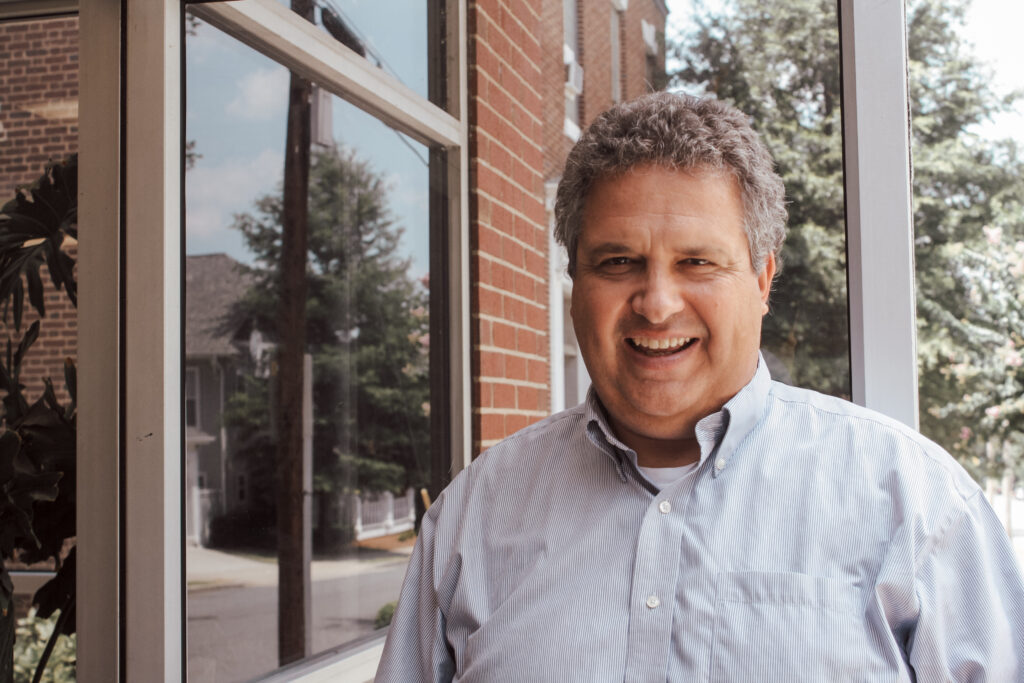Deepening the Bench
February 14, 2024Take Shelter
May 8, 2024
Tony Marciano reflects on tenure as addiction recovery leader

On June 9th at 3:00, Tony Marciano will hand a pair of shoes to Trina Fullard, his successor as President and CEO of Charlotte Rescue Mission (CRM). The gesture will symbolize the end of Tony’s tenure.
“I’ll say, ‘Trina, you’re not stepping into my shoes, you’re stepping into your own shoes,” Tony explains. “The calling on your life is very different than the calling on my life. So, all I ask is that you’ll step into your shoes.”
For almost 28 years, Tony has led the charge for growth and impact at CRM, and his passion for the work is unmistakable.
But when Tony first arrived in Charlotte in 1996, he faced a series of challenges. The biggest? Reframing addiction as a disease. “CRM’s programming was solid,” Tony recalls. “The staff had a really good handle on what they were doing with clinical addiction and professional counseling.”
There just wasn’t a lot of momentum in the community.

He continues, “In the ‘90s, CRM was unique because we were operating on the disease concept. In the world of rescue missions, while all operate as Christian organizations, they tend to view addiction as a moral issue. We look at it as a brain issue, an emotional issue, and a spiritual issue.”
Tony, who also spent seven years as a commissioned officer with the Salvation Army, credits his doctrine teacher at that institution for demonstrating that transformation is not about the perfection of performance – rather, the perfection of character.
He notes, “If I can’t help you with why you do what you do, I can’t keep you clean and sober.”
Tony remembers, early on, helping a mother get settled at Dove’s Nest. “She looked at her kids and apologized because she was going to be gone, in the program, for the holidays. She said, ‘I’m sorry, I won’t be home for Halloween or Thanksgiving or Christmas.’ And her kids replied, ‘But mom, the only thing we want for Christmas is a sober mommy.’
To reckon with disease is a grueling process, and Tony applauds his team for championing each client’s internal transformation as they address the root cause of addiction.

Throughout his tenure, Tony’s learned the root cause has a name, and that name is shame. He observes: “Guilt says I’ve done something wrong. Shame says I am wrong. I’m defective.”
CRM must acknowledge the pain of a client’s past because, unfortunately, trauma begets trauma. “It’s not just the person in front of us who’s in crisis,” Tony shares. “If the adult doesn’t get help, in 20 years, their children will either become an alcoholic, marry an alcoholic, or both.”
The PTSD that CRM clients battle is the product of long-term physical, verbal, emotional, and/or sexual abuse. Its impact on the brain is threefold: the hippocampus shrinks, so the ability to learn new information is diminished. The prefrontal cortex shuts off. And the amygdala gets stuck in fight, flight, or freeze mode, resulting in cycles of reactive behavior.
Tony recalls sitting at the Community Matters Café for lunch one day when a student named Susan dropped a stack of plates. Tony encouraged her to get a broom and sweep up the mess. “I looked at her and said, ‘Susan, you made a mistake. You are not a mistake.’ I knew in her family of origin, she would have heard, ‘You’re such an idiot, I wish you weren’t born, I wish you were dead.’ And those were messages she would have internalized. We started the Café as a safe place to make mistakes. Helping somebody see themselves differently takes time.”
In fact, CRM’s team needs a minimum of 60-70 days to start unraveling a client’s addiction. The effort is monumental and involves the input of professionals as well as volunteers. “I liken it to a diamond ring,” Tony shares. “The facets are what make that diamond sparkle. Every activity that somebody does at CRM is a facet. Who gets the credit? It doesn’t really matter. But all of us do something, and the client says, ‘That individual treated me as a person, not as a project. I am going to finish this program.’”

It’s been nearly 30 years since his arrival in the Queen City, and Tony is encouraged by the community’s heightened awareness of what addiction is and what it is not. And while Tony is ready to retire, the work isn’t over yet.
He points out, “Nobody ever writes in a high school yearbook, ‘My goal is to be homeless and addicted on the streets of Charlotte.’
“We can do more as a community than just feed and shelter our neighbors. We can help them achieve their greatest potential. Isn’t that what we would want for them? Not that they’re living in squalor housing that you or I wouldn’t even walk into, or working a job with a boss that pays them under the table with no disability, no future social security, no nothing. Our neighbors aren’t categories, they’re people. So, let’s catch a bigger vision for what we can do.”
Come June, it will be Trina’s turn to carry the vision, and her predecessor intends to be her loudest cheerleader. As the saying goes, you can tell a lot about a man by walking a mile in his shoes. The soles of Tony’s are, without a doubt, a testament to the soul of Tony.
